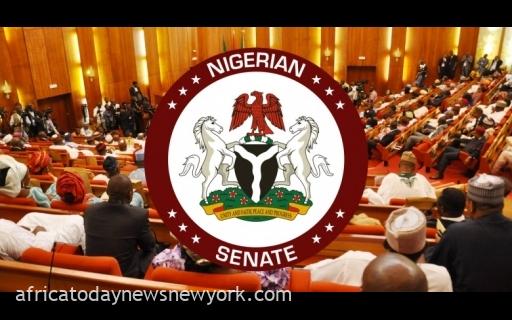In its session on Wednesday, the Senate reviewed two related proposals intending to bar the Governor and Deputy Governors of the Central Bank of Nigeria (CBN) from involvement in political affairs.
The upper chamber passed the two bills, sponsored by Senators Sunday Karimi and Darlington Nwokocha, after a second reading during the plenary.
It was proposed by the senators that Section 9 of the CBN Act, 2007, should prevent the CBN Governor and Deputies from joining any political party or involving themselves in any political activity while holding their positions.
Furthermore, they recommended that the board of the CBN incorporate representatives from the Auditor-General of the Federation, the Chairmen of the Federal Inland Revenue Service (FIRS), and the Chartered Institute of Bankers in Nigeria (CIBN).
The bills are introduced in light of the recent endeavor of the former CBN Governor, Godwin Emefiele, to run for the 2023 presidential election.
However, Senator Adams Oshiomhole, who represents Edo North Senatorial District, opposed the bill’s second reading, arguing that the situation of the former CBN Governor, Godwin Emefiele, which served as the case in point, was a product of governance gaps and a failure to uphold the current laws.
Read also: British Envoy Expresses Deep Concern Over Off Cycle Polls
Consequently, the Deputy Senate President, Jibrin Barau, directed the Senate Committee on Banking and Finance to submit a report on the CBN Amendment Bill within two weeks.
During the main debate on the amendment, Mr. Nwokocha pointed out the requirement for adjustments to the CBN Act to facilitate the regulation of the bank in accordance with international standard practices.
He stressed that the amendment is designed to implement a strong governance mechanism for monetary policies within the nation.
According to him, the bill seeks to: ‘Separate the head of management from the head of the governing Board in line with national and international good corporate governance practices.’
‘Establish a proper governance architecture for the monetary authority for optimal policy and operational effectiveness;
‘Enshrine real-time controls and effective accountability in the conduct of central banking in Nigeria.’
’Reposition the CBN towards pursuit and advancement of its core mandates given the Bank’s pivotal role in the economy; and 44) Position the CBN as an apolitical entity that will become a worthy example in national and international monetary policy, banking sector regulation, currency management, and supervision.’
While spearheading the debate on his bill, Mr. Karimi emphasized the importance of amending section 9 of the CBN Act to restrict governors and deputy governors of the apex bank from political participation.
’I’m proposing that section 9 be amended further that will ban the CBN governor and deputies from participating in politics when they are in service,’ he said.
The amendment of the Act, as highlighted by Mr. Karimi, will make room for the inclusion of the auditor-general of the federation, the chair of the Federal Inland Revenue Service (FIRS), and the Chartered Institute of Bankers in Nigeria (CIBN) within the CBN board of management.

